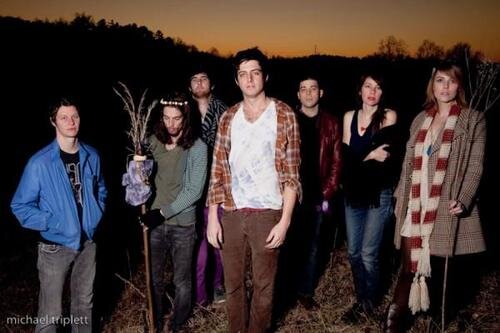The Love Language Opens Up

On "Ruby Red," The Love Language's Stuart McLamb learns to share.
Stuart McLamb was just another 21st Century success story.
A broken heart, a dismantled band and seclusion sprouted The Love Language, McLamb's then-solo project. Quickly, The Love Language became known for its penchant for lovesick, '60s pop. As the music spread, McLamb's one-man act grew into a full live band. Now, five years later, The Love Language is not the depressed lo-fi band birthed in McLamb's parents' basement. With its latest album Ruby Red, McLamb is in the company of more than himself, with dozens of friends and peers getting credit for helping the record come together.
"There's no right or wrong way to make a record," McLamb says, as The Love Language preps to play Gasa Gasa on Thursday. For Ruby Red, McLamb says he was still calling the shots and writing the songs, but with a willingness to do something different. "I'm not dealing with things as insular," he explains. "It's not an egotistical record. You're not overly bombarded with Stu." But the choice to move from emotional, personal writing to wider themes and lighter tunes wasn't a conscious choice, but a natural progression as McLamb's circle grew to include friends like Brad Cook of Megafaun.
That growth shows in Ruby Red, a record that floats by with poptimism, at times recalling the more chipper outings of The Shins while maintaining loyalty to '60s and '70s pop rock. What makes Ruby Red work is how much fun it is. Shimmery guitar lines and propulsive percussion throughout work toward a more upbeat sound, providing lighter songs that don't sacrifice depth. It makes the slower songs more palatable and less maudlin, a progression in McLamb's music that first started emerging with the Love Language's initial live shows.
"Somehow through that first touring lineup, we got a party band reputation," McLamb says. Like Ruby Red, the live shows see different friends and musicians coming and going, bringing "their own thing" to the lineup. "I never try to put too much control on the live show," McLamb says. Though he's grown warmer to opening up his project, the Love Language will always be McLamb's. "I'm still very much in the director's seat," he says. For the next record, McLamb plans to start recording when the fall tour ends, and while he wants to remain open to collaboration, he still prefers to do it himself.
The Love Language have established a phone line that fans can call to talk to members of the band. If you'd like to call them, dial 872.LUV.LANG.






